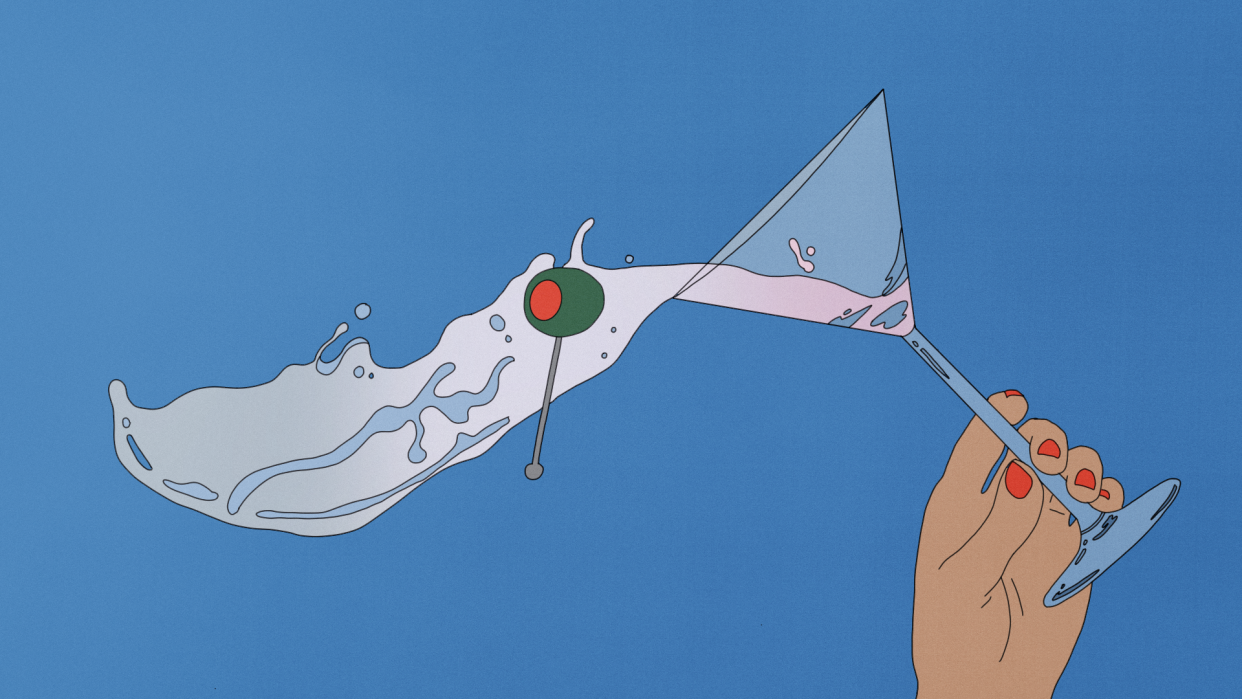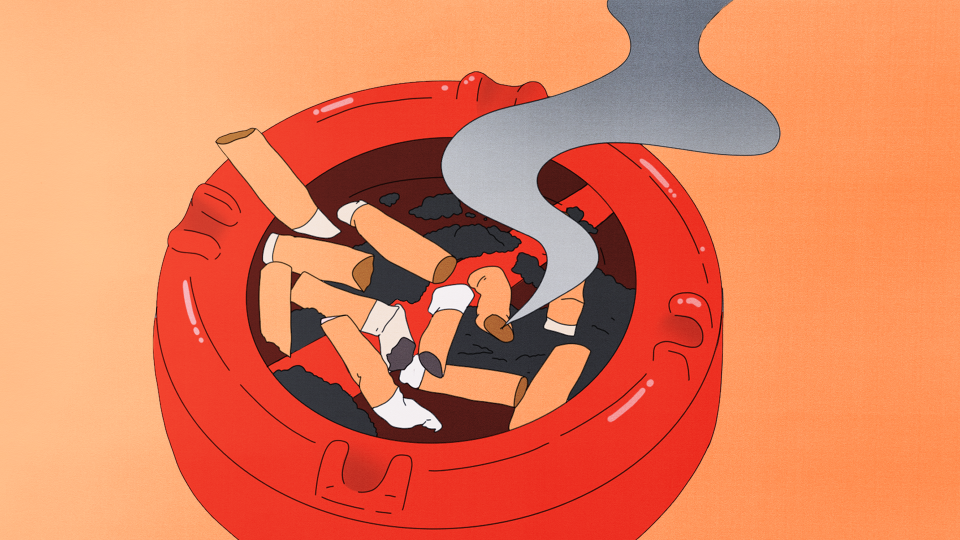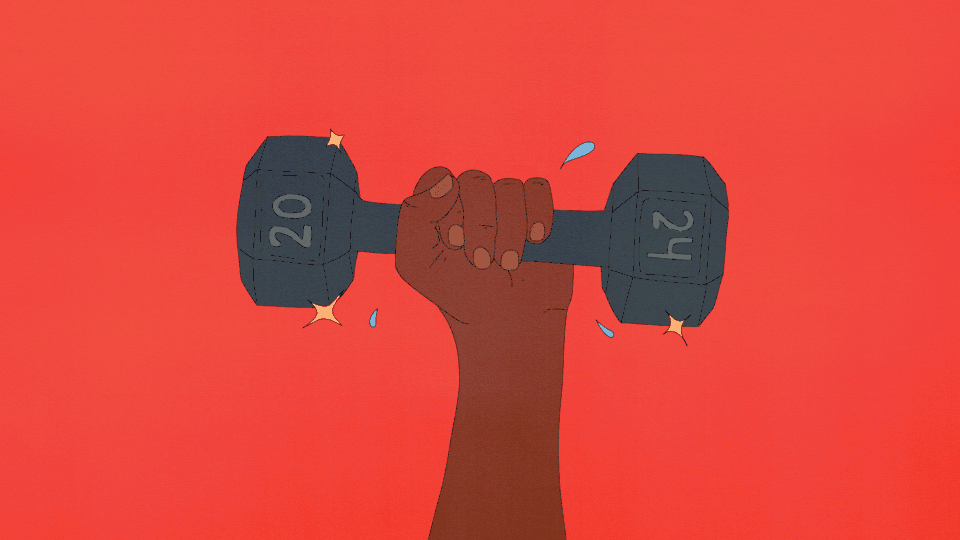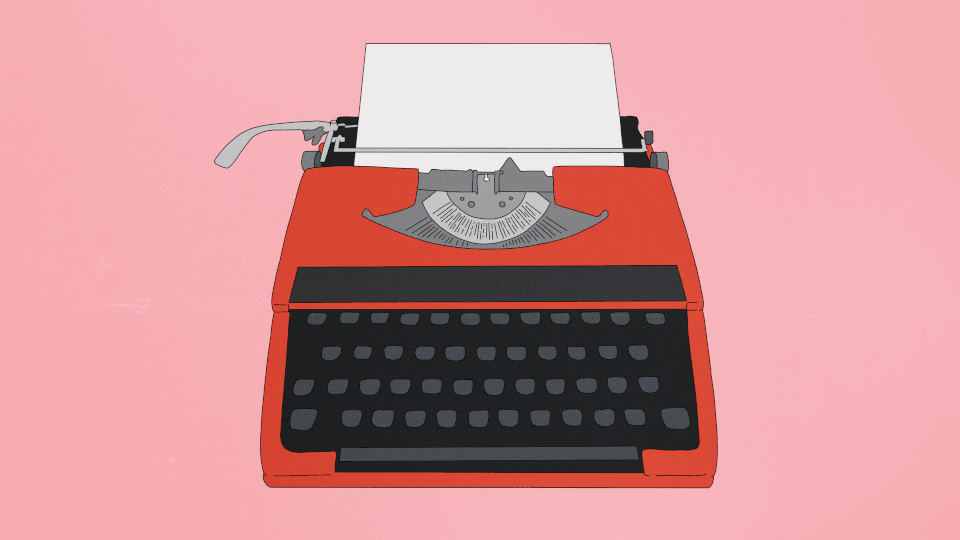Learning How to Quit Drinking Was the The Biggest Gift I’ve Ever Given Myself

Channing Smith
The below guide on how to quit drinking is part of Glamour's 2024 Smart Goals series, which explores reasonable, quantifiable, and—crucially—sane ways to embark on self improvement objectives you'd like to complete this year. We all know traditional New Year's resolutions are nonsense and are mostly designed to make us feel terrible about ourselves and, as a result, spend money on things we think we need to live a more fulfilling life. Here, writer Micaela English shares of her personal sobriety journey and enlists the advice of experts for anyone looking to quit drinking in 2024, for whatever reason.
Four years and 10 months ago, I learned how to quit drinking. It wasn’t a Dry January or Sober October experiment, though I’d done those in the past. It was a full-on epiphany: this substance is no longer serving me. Looking back, I never could have understood how drastically the words, “I don’t drink” would transform my life. I didn't realize how badly I needed to set myself free from the merry-go-round of wine dinners, after work cocktails, brain fog, alcohol-induced anxiety, skin conditions, and that sense that I "needed something" to function in social situations.
At the time, I had gone through periods of abstaining from alcohol, and had even stopped cold turkey in my early 20s, but ultimately, it would always creep back into my life. I think the hardest part of looking back on that chapter, particularly when I was a magazine editor attending black tie galas and glamorous after parties where the alcohol was flowing like water, was that in my gut, I knew I wasn’t being authentically myself. In a sense, it felt like self-betrayal, because with every drink, I was moving farther away from myself and ultimately, my goals.
Smart Goals
I did it a decade ago and never looked back. Let's make 2024 the year you do, too.
However, when I made the decision to stop for good in my early 30s, I was not at my “rock bottom” or getting drunk every night—but it was clear to me that the after effects of alcohol were coming in between me and my personal best, and I was sick and tired of feeling sick and tired. I stopped drinking because while I knew I didn’t want to drink, I still felt the social pressure in group settings. I stopped drinking because sometimes making an issue a hard yes or a hard no, with no in between, is the only way to fully break free.
Moderation didn’t work for me, because alcohol doesn’t work for me. It’s that simple.
Having the willpower to remain alcohol-free for almost five years (February 2024 will be my fifth anniversary) has opened my life up like that scene in The Wizard of Oz where everything goes into technicolor. Zooming out, I can see how it has completely changed my life’s course—my clarity, decision making, relationships, confidence, and how much I know and love myself. I’ve achieved accomplishments during the past five years that felt impossible when I was drinking. I wake up with energy, clarity, and no alcohol-induced regret. I go to sleep at peace with zero blurriness of what happened earlier that night.
That said, I fully understand that many people (including many of my closest acquaintances) do not experience the effects drinking he way I did. Their relationship with alcohol does not interfere with their day to day life or how they feel. I respect everyone’s decisions to live their life the way it feels best for them and hold no judgement. That’s life—you have to do what feels best for you. However, it seems people have become more open than ever about reevaluating their own relationships with alcohol, whether that means cutting it out completely or simply cutting back.
Smart Goals
This is the year I finally say no to the “gymtimidation” that's stood in the way of my fitness goals. Here's how I'm doing it.
There are so many zero-proof options on bar and restaurant menus, and plenty of celebrities from Cara Delevingne to Drew Barrymore discussing their own alcohol breakups. Yet at the same time choosing to not drink in a society where drinking is the norm, is not always easy to navigate.
Below, a roadmap of how to reassess your relationship with alcohol and ultimately, tips and tools to actually stop drinking (if that is right for you) from experts like New York City-based Neuropsychologist and Director of Comprehend the Mind, Dr. Sanam Hafeez, Substance Abuse Coach & Founder of LMR Coaching Lance Robinson, Dr. Joseph R. Volpicelli M.D., Ph.D., Institute of Addiction Medicine, and Dr. Sarah Church a clinical psychologist, founder of Wholeview Wellness and Former Executive Director of the Division of Substance Abuse at Montefiore Medical Center.
Regardless of where you are on your journey, please know I’m rooting for you, and what feels the best for you. On the other side of this and at almost 5 years, I will say, breaking up with alcohol has been the biggest gift I’ve ever given to myself. There’s no better time than now to take inventory and be real with yourself, as Dr. Church wrote to me, “If you have concerns about your drinking, my advice would be that you shouldn’t wait to talk to someone. There are many different ways that a trained therapist can help you sort through your thoughts on this topic and it is always better to make changes early than to wait until something happens.”
You've decided to quit drinking…what's next?
After reevaluating your life with drinking, and coming to the important realization (that only you can come to) it can feel daunting about where to turn next. Dr. Church says, “Once you've made the decision to stop drinking, take a deep breath and congratulate yourself! That was a big step.” Next, Dr. Church advises creating a plan to stick to your goals and how to quit. “If you’ve tried to stop before and found it to be hard to do, consider seeking professional guidance (e.g., a psychologist, social worker or psychiatrist who has expertise in this area).
In some cases, you might need medical support to taper off alcohol, so having an evaluation is important. Once you're ready to take the plunge, set a date to stop. Remove all of the alcohol from your home.” Dr. Church added a free resource for people to assess their relationships with alcohol, MyRelationshipWithAlcohol.com."
You might have side effects, so be prepared.
Depending on how much alcohol you’re consuming, there is the possibility for side effects (some which may be best to seek medical attention) for Dr. Hafeez explains that the intensity of the side effects depends on the duration of heavy drinking and your overall health, but to expect that “Some common side effects of alcohol withdrawal include irritability, mood swings, headaches, nausea, anxiety, and, in severe cases, seizures.”
Get support.
It’s important to know that you are being supported with this decision. Dr. Hafeez advises looking into outpatient counseling which allows individuals to attend counseling sessions while living at home or support groups like Alcoholics Anonymous (AA) or SMART Recovery which can provide a sense of community and understanding. These groups offer peer support and a structured environment for individuals seeking to address their substance use.
Additionally, Medication-Assisted Treatment can also be beneficial in some cases for medications that may be prescribed to help manage withdrawal symptoms and cravings. Additionally, find your people. Dr. Church says to “find a therapist you feel comfortable with and set up weekly meetings. Confide in friends and family who can provide emotional support. Online forums and communities can also offer a platform to share your experiences and to seek advice like (www.myrelationshipwithalcohol.com, Reddit - r/stopdrinking).”
Smart Goals
You've always said you've got a book in you. Why not make writing it a reality 2024?
How to manage not drinking in social situations.
“Start out easy,” says Dr. Church, “In the beginning, choose social activities that don't revolve around alcohol, you can work up to challenging situations.”
You need to know yourself and your barometer for what feels right for you in terms of how comfortable you feel in your abstinence from alcohol. And while avoiding a situation altogether may be the best option in the beginning of your journey, you might feel you don’t want to sit this one out and actually go experience it. In these moments, Robinson advises, “Order a cranberry and seltzer and don’t be concerned about someone asking you why you’re not drinking. If you don’t feel fully comfortable or mentally ready, just leave early.”
Benefits to your body and life when no longer drinking alcohol.
While you might start to notice clearer skin, a less puffy face, weight loss, brightness to your eyes, and a clearer mind, there are many other positive effects to your body when you stop drinking.
“Heavy drinking or binge drinking has many harmful effects on the body," says Dr. Volpicelli. "As alcohol is broken down it forms a molecule, acetaldehyde, which is a poison on the body. This poison over time can cause damage to many organs such as the liver, pancreas, stomach, brain and other nerve cells. Acetaldehyde can also cause inflammation of the skin, interferes with immune functioning and increases the risk of cancer, particularly breast cancer in women.” Abstaining from alcohol may also reduce the risk of liver diseases and cardiovascular issues, adds Dr. Hafeez.
Some other vital and immediate health improvement you might experience when you quit drinking: no more dreaded “hangziety.” "When one no longer feels hungover after drinking, you’ll notice improved energy and less feelings of anxiety” Dr. Volcipelli says.
What if cravings or triggers arise?
“First, you want to understand what your triggers are and avoid as many of them as possible,” says Dr. Church. However, there are many triggers that are unavoidable, like feelings of sadness, or loneliness. When this happens and you can’t avoid a trigger or are craving a drink, Dr. Church says,”You can practice strategies for coping with cravings and use a trial and error method to figure out what works best for you. Some common strategies include physical activity, practicing mindfulness, or reaching out to a friend. Distraction techniques are also helpful, like taking a walk, putting on music or engaging in a hobby.”
Fill your time.
Now is the time to explore new hobbies. Robinson goes on to share his own experience, “Becoming sober is not a death sentence. It [can be] a rebirth, like a second life. You'll quickly see that the enjoyment you have doing all of these things sober far outweigh doing them while drinking. On top of that many new hobbies and experiences will enter your life. Things you always wanted to do or try but you never did because alcohol got in the way. They call them barstool dreams. Things you always spoke about doing but never did.”
Robinson says on the anniversary of his sobriety each year, he does something he's always wanted to do but haven’t yet. “I've taken violin lessons, learned how to fly a plane, got into Jiu Jitzu, the list goes on. I promise you that you will see that there is such a bigger beautiful world out there without a drink in your hand.”
Study up with books and podcasts.
Support your growth and this next phase with useful books and podcasts to give you more perspective on the topic of drinking. “There are hundreds and hundreds of books on Alcoholism and sobriety. The most famous and widely read book is called the Big Book of Alcoholics Anonymous, and in my humble opinion it’s the first book you should read.” advises Robinson. Dr. Church says that books like, This Naked Mind by Annie Grace and Drinking: A Love Story by Caroline Knapp are a good start and podcasts like Recovery Rocks and Sober Curious can offer valuable insights and support.”
Remember: Take it one day at a time
“My initial advice to all my patients is to try to slow down," says Dr. Church. “I would encourage people to have a lot of compassion for themselves. Quitting drinking is not easy and it takes a lot of focus and practice,” he says. "Try to keep your focus on the present moment, don’t worry about how long you're going to stay sober, just don’t drink right now. Some people say, “One day at a time”, but I think there are moments in the beginning that you can take it “Breath by breath.”
If you or someone you know is struggling with alcohol addiction, please contact the National Institute on Alcohol Abuse and Alcoholism.
More Smart Goals:
How to Quit Smoking
How to Start a Podcast
How to Start Going to the Gym
How to Start the Divorce Process
How to Start a Book
How to Quit a Job
Originally Appeared on Glamour




